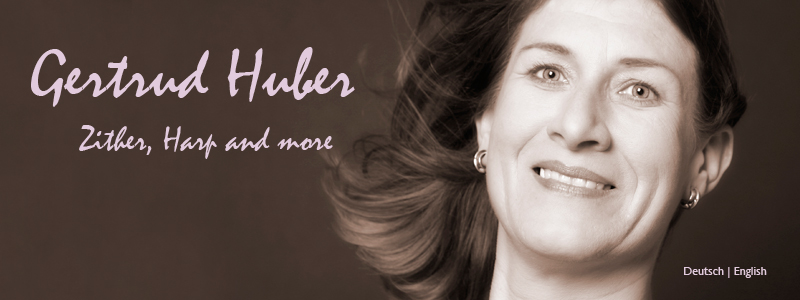
Research
Her critical stance to issues dealing with Alpine folk music, the focus on the zither and educational questions has been repeatedly expressed in music publications, lectures, comments on new publications, and in essays. With completition of her dissertation "The zither in America. How the 'modern mountain zither' is played in USA based on four case studies" 2014 Gertrud Huber finished her Ph.D. studies at Institute of folk music research and ethnomusicology.
The modern mountain zither in its present form and style of playing has only emerged in the last two centuries as an acknowledged type of instrument. Social, ethnographic, and historical aspects of music in the first half of the 19th century formed an environment in which the development of the zither was possible. As a result, the zither began as a musical counterpart to the popular middle-class piano.
German immigrants in North America, the largest immigrant group in the 19th century, also influenced the social, intellectual and cultural life of the United States. The German settlers brought this stringed instrument to their new home. In many ways it has undergone its own individual development in its new environment.
This PhD dissertation explains how the zither, a very "German" or "Alpine" musical instrument, functions to identify immigrants with their ancestors and serves as a way to remember and live out their ancestral culture. Special emphasis is given to aspects of assimilation and of new political alignments with Germany.
Little about the zither has been published. Most books have been written by amateur researchers. Besides older works dealing mainly with instrumental construction, tuning and history of the zither, a few more recent works primarily illuminate the prominence of the zither in Vienna and Munich.
Because relevant research findings are so scarce, emphasis will be put on those ethnomusicological methods involving audio-visual recorded field research, transcription and analysis. This will form the basis for the information-gathering necessary for my dissertation. Zither music collected in the United States will be systematically documented. After which the attempt will be made to determine its significance for the contemporary life of German immigrants and their descendants in the USA. Case studies from different areas of the US-zither community will attempt to illuminate not only their musical context but also their individual socio-cultural contexts in order to portray the zither in the focus of cultural memory and collective memory culture among German US immigrants and their descendants.
Publications and presentation
Her critical stance to issues dealing with Alpine folk music, the focus on the zither and educational questions has been repeatedly expressed in music publications, lectures, comments on new publications, and in essays:
Selection:
 |
"Viennese Sound vs. Munich Sound. A study on zither tunings and their consequences for multipart zither music.". Forthcoming. |
 |
Die Stimmungen im Zitherspiel - Konsolidierung vs. Vielfalt und Schwächen.". Forthcoming. |
 |
"Treu dem guten alten Brauch!? - Gedanken zur Vermittlung traditionell alpenländischer Zithermusik". Open Online Journals Universitätsbibliothek Bayreuth. |
 |
"The conservation of memory and function of identity in European zither instruments and zither music: a comparison of the Norwegian Langeleik, the Hungarian Citera and the Alpine Zither" – International Graduate Student Conference at Istanbul Technical University 2014: "Identities – an interdisciplinary approach". |
 |
"25th Year Anniversary of the Seggau Folk Music Seminar - a Quarter of a Century of Commitment to the Musical Culture of the South Styrian Wine Lands" - Diploma Thesis |
 |
"From the Scheitholt to the Psaltery Zither - The zither's long path to perfection" - Exhibition at the festival "Zither 1 in Munich" |
 |
"George Freundorfer - a Dance and Entertainment Zither Performer" - Study and Accompanying Article "Saitenspiel" and "ZNUSA" |
 |
"Always more of the same?" (Wiederkehr des Immergleichen?") - Opening Lecture, 30th Folk Music Seminar Anniversary |
 |
"How do you do it?" - Lecture held at Trossingen |
 |
"The Viennese Zither. 1800 - 1850". (Zitherspiel in Wien. 1800 - 1850") - Review of a Dissertation written by Dr. Joan Marie Bloderer in "Volksmusik in Bayern, 27. JG., 2010/Heft 2" und "Saitenspiel" |
 |
Rezension zur Magisterarbeit von Mag. art. Alexander Mayer "Nikolaus Weigel - Die Neue theoretisch praktische Zither-Schule (1857), Bausteine zu Werk und Leben" in "Saitenspiel" |
 |
"Richard Gruenwald’s tomb in Klosterneuburg – Austria" documentation 2011 |
 |
"Ist die Zither weiblich? Gendervergleich akademisch ausgebildeter Zitherspieler und Zitherlehrer mit Zitherspielerinnen und Zitherlehrerinnen" - Artikel in "Phoibos - Zeitschrift für Zupfmusik, published by Silvan Wagner, 1/2012 |
 |
"Frauen in Wissenschaft und Lehre - Wissenschaftswissenschaft, Feldforschung und Lehrer anhand dreier Beispiele" - Interview bei Eigenklang, RadioOrange 94.0/Emap.FM InternetRadio 2013 |
 |
"The Zither in America - a Cliche Kept Alive by Alpine Immigrants?" - Fifth International Doctoral Workshop in Ethnomusicology, University of Hildesheim and the Hanover University of Music, Drama and Media 2013 |